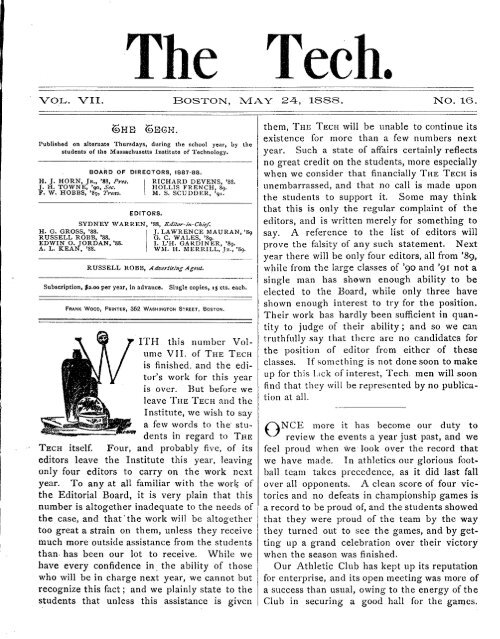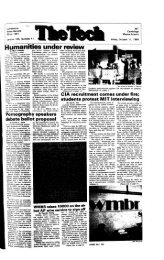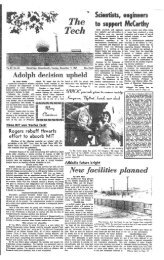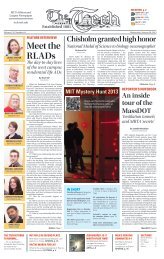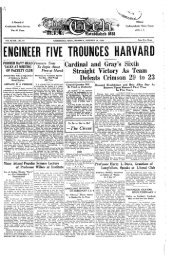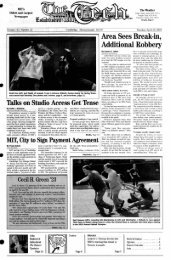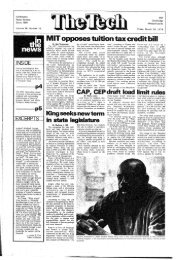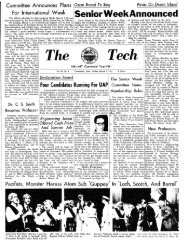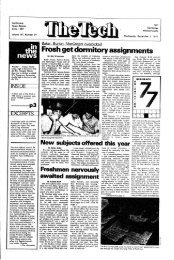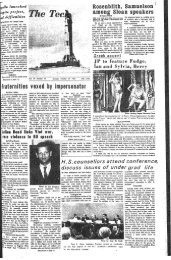The Architec- tural Review. - The Tech - MIT
The Architec- tural Review. - The Tech - MIT
The Architec- tural Review. - The Tech - MIT
You also want an ePaper? Increase the reach of your titles
YUMPU automatically turns print PDFs into web optimized ePapers that Google loves.
<strong>The</strong> <strong>Tech</strong>.<br />
VOIL. VII. BOSTON, Y 2, 1888.Y 1NO. 16.<br />
6I-B 6nGH.<br />
Published on alternate Thursdays, during the school year, by<br />
students of the Massachusetts Institute of <strong>Tech</strong>nology.<br />
BOARD OF DIRECTORS, 1887-88,<br />
H. J. HORN, JR., '88, Pres. RICHARD DEVENS, '88.<br />
J. H. TOWNE, 'go90, Sec. HOLLIS FRENCH, 89.<br />
F.- W. HOBBS, '89, Treas. M. S. SCUDDER, '91.<br />
EDITORS.<br />
SYDNEY WARREN, '88, Editor-in-Chief.<br />
H. G. GROSS, '88. J. LAWRENCE MAURAN, '89<br />
RUSSELL ROBB, '88. G. C. WALES, '89.<br />
EDWIN O. JORDAN, '88. I. L'H. GARDINER, '89.<br />
A. L. KEAN, '88. WMI. H. MERRILL, JR., '89.<br />
RUSSELL ROBB, Advertising Agent.<br />
Subscription, $2.00 per year, in advance. Single copies, xS cts. each.<br />
FRANK WOOD, PRINTER, 352 WASHINGTON STREET, BOSTON.<br />
ITH this number Volume<br />
VII. of THE TECH<br />
is finished, and the editor's<br />
work for this year<br />
is over. But before we<br />
leave THE TECH and the<br />
Institute, we wish to say<br />
a few words to the' students<br />
in regard to THE<br />
TECH itself. Four, and probably five, of its<br />
editors leave the Institute this year, leaving<br />
only four editors to carry on the work next<br />
year. To any at all familiar with the work of<br />
the Editorial Board, it is very plain that this<br />
number is altogether inadequate to the needs of<br />
the case, and that' the work will be altogether<br />
too great a strain on them, unless they receive<br />
much more outside assistance from the students<br />
than has been our lot to receive. While we<br />
have every confidence in the ability of those<br />
who will be in charge next year, we cannot but<br />
recognize this fact; and we plainly state to the<br />
students that unless this assistance is given<br />
the<br />
them, THE TECH will be unable to continue its<br />
existence for more than a few numbers next<br />
year. Such a state of affairs certainly reflects<br />
no great credit on the students, more especially<br />
when we consider that financially THE TECH is<br />
unembarrassed, and that no call is made upon<br />
the students to support it. Some may think<br />
that this is only the regular complaint of the<br />
editors, and is written merely for something to<br />
say. A reference to the list of editors will<br />
prove the falsity of any such statement. Next<br />
year there will be only four editors, all from '89,<br />
while from the large classes of 'go and '9I not a<br />
single man has shown enough ability to be<br />
elected to the Board, while only three have<br />
shown enough interest to try for the position.<br />
<strong>The</strong>ir work has hardly been sufficient in quantity<br />
to judge of their ability; and so we can<br />
truthfully say that there are no candidates for<br />
the position of editor from either of these<br />
classes. If something is not done soon to make<br />
up for this Lick of interest, <strong>Tech</strong>. men will soon<br />
find that they will be represented by no publication<br />
at all.<br />
NCE more it has become our duty to<br />
review the events a year just past, and we<br />
feel proud when we look over the record that<br />
we have made. In athletics our glorious football<br />
team takes precedence, as it did last fall<br />
over all opponents. A clean score of four victories<br />
and no defeats in championship games is<br />
a record to be proud of, and the students showed<br />
that they were proud of the team by the way<br />
they turned out to see the games, and by getting<br />
up a grand celebration over their victory<br />
when the season was finished.<br />
Our Athletic Club has kept up its reputation<br />
for enterprise, and its open meeting was more of<br />
a success than usual, owing to the energy of the<br />
Club in securing a good hall for the games.
242<br />
Several <strong>Tech</strong>. records have been broken, and<br />
our Freshmen have sustained the Institute in<br />
its tug-of-war reputation by defeating the Harvard<br />
Freshman team.<br />
<strong>The</strong> Senior Ball, in spite of much opposition<br />
from under-classmen and THE TECH, finally did<br />
come off, and its managers deserve great praise<br />
for their efforts in trying to make the affair a<br />
success under so many difficulties.<br />
In a literary way we have progressed since<br />
last year. THE TECH has done its best, and<br />
the Quarterly and "<strong>Tech</strong>nique" have both done<br />
remarkably well. <strong>The</strong> year is marked by the<br />
appearance of a new periodical, <strong>The</strong> <strong>Architec</strong><strong>tural</strong><br />
<strong>Review</strong>. This paper is one of which every<br />
student of the Institute may well feel proud,<br />
both on account of its artistic merits and because<br />
it is a decided innovation in college journalism,<br />
in which we may well congratulate ourselves<br />
in having taken the first step.<br />
Our Glee Club has acquitted itself as finely<br />
as usual, and has given several successful concerts.<br />
<strong>The</strong> Orchestra, sad to relate, has not<br />
been a success, and has finally expired. Whilst<br />
we have no banjo club at the Institute, several<br />
of our banjo players have distinguished themselves<br />
in this line in several concerts in or near<br />
Boston.<br />
'9go has sustained her athletic reputation of<br />
last year, and defeated the Freshmen both on<br />
the foot-ball field and the tug-of-war cleats.<br />
Altogether affairs at the Institute are flourishing,<br />
and THE TECH congratulates the students<br />
that it is so.<br />
IT is no longer a source of wonder to us whence<br />
comes that annoyingly "fresh" element that<br />
forms a part of every Freshman Class entering<br />
the Institute. When High School students just<br />
about to enter college, perhaps, conduct themselves<br />
like primary-school children, and abuse<br />
the kindness and generosity of their friends<br />
who have already rubbed off somewhat of their<br />
greenness by a year at the <strong>Tech</strong>., it is time a<br />
word was said to give these embryo Freshmen<br />
a pointer.<br />
TH4E2 TERCH.<br />
We refer to the cheering, and otherwise<br />
rowdy conduct of some of the High School<br />
students from in and about Boston, at the drill<br />
in Mechanics Fair building.<br />
It is bad taste, to say the least, to take advantage<br />
of the opportunity offered for showing their<br />
dislike or approval, to interrupt the proceedings<br />
by cheering, yelling, and, in short, attempting<br />
to run the whole affair.<br />
We do not wish to make these statements<br />
sweeping, but let those whom the coat fits put<br />
it on. IJet the Freshmen run their own drills,<br />
and more real enjoyment would be derived from<br />
them with the omission of these annoying sideshows,<br />
offered free gratis by the Sophomore<br />
Class and outsiders, who abuse their privileges.<br />
'E think that a great improvement might<br />
easily be made over the present method of<br />
getting our mail from the. cage. <strong>The</strong>re are but<br />
few men who go there much for mail matter,<br />
who do not feel this, and more especially those<br />
unfortunates whose names are so fixed alphabetically<br />
that they cannot see whether there is any<br />
mail for them or not, but have to inquire to find<br />
out. It would be so easy to have a system of<br />
letter boxes made, somewhat on the principle in<br />
use at a post-office, that we think it ought to be<br />
done. <strong>The</strong> first expense could easlly be defrayed<br />
by charging each man so much for a box,<br />
and after the cost was thus paid, the price for a<br />
box could be made merely nominal, so that only<br />
those who really wanted a box would have one.<br />
We should say that four hundred of these boxes<br />
would be amply sufficient, and that number could<br />
be put in around the sides of the cage, or if not<br />
so many, at least enough for those men who get<br />
most of their mail at the Institute. <strong>The</strong> present<br />
method of letting each man pick out circulars,<br />
or notices from the Faculty, sent out at the<br />
same time to all his classmates, is certainly not<br />
the best way to manage affairs of this sort, and<br />
an arrangement of boxes would do away with<br />
this trouble altogether.<br />
Another thing about the cage we think would<br />
be a good addition. This is the placing of a<br />
U<br />
I<br />
I<br />
N<br />
I<br />
v
ailing in front of the window, as is done at the<br />
box-office of a theater, so that when there are<br />
many men trying to get there at the same time,<br />
they will have to line up and let each one take<br />
his turn. This would do away with the howling,<br />
pushing mob that we have seen at times fighting<br />
around the cage, each trying to get ahead of the<br />
other, and thus unnecessarily delaying everybody.<br />
WjHE TECH is sorry to say that there are a<br />
number of men who have not yet paid up<br />
their subscriptions, and whom past experience<br />
teaches us will endeavor to avoid payment if<br />
possible. It is very disagreeable for us to have<br />
to mention this fact, but we do so merely that<br />
our position may be understood by the students,<br />
if we are forced next year to adopt a different<br />
system of collecting subscriptions, and to require<br />
each man to pay up before receiving his TECH<br />
ticket book.<br />
IT has often occurred to us that if our examinations<br />
are intended to examine us in a subject,<br />
why are they not prepared more carefully<br />
for that purpose. It often happens that when a<br />
man goes in to an exam. he finds questions on<br />
a paper which are so ambiguous, or so badly<br />
stated, that it is next to impossible to understand<br />
what it is the Professor wishes answered,<br />
and it is not always possible to get the information<br />
from him. It seems to us this is piling it<br />
on a little too heavy. If it is desired to have<br />
the whole subject written up, would it not be<br />
better to so state the question and thus leave<br />
no doubt. <strong>The</strong>re is the more feeling among the<br />
students about this from the fact that it is generally<br />
understood that if a man answers more<br />
than is necessary and answers correctly he gets<br />
no credit for his extra work, whilst if he has<br />
answered a part wrong which it was not intended<br />
he should answer at all, his mark suffers in consequence.<br />
THE TECC H.2.<br />
Dueling in Germany.<br />
243<br />
T may be of some interest to the reader to<br />
know how the old barbarous custom of dueling<br />
is still practiced among the German students of<br />
to-day. While in Berlin last winter, one morning<br />
on Untir den Linden I passed a student<br />
who appeared to be in a deplorable condition.<br />
His head was terribly cut, and the portion of<br />
his face which was not concealed by.layers of<br />
cotton batting, wore an expression which excited<br />
one's sympathies. On the following morning,<br />
to my great surprise, I met several other students<br />
who appeared to be in the same scarred<br />
condition.<br />
This excited my curiosity, and upon inquiry I<br />
found that these were the students who hadtaken<br />
part in some friendly duels a few days<br />
before. Perhaps the duels had been friendly,<br />
but the students looked to me as though they'<br />
had received far from friendly treatment.<br />
<strong>The</strong>se dueling students are mostly members of:<br />
the different corps, and can easily be distinguished<br />
by the color of the cap they wear.<br />
Now, the only way to witness a duel between<br />
members of a corps is to form the acquaintance<br />
of one of them, and this I was bent upon doing.<br />
Within a few da s I was fortunate enough to<br />
meet an American student who was about to<br />
take part in a duel; and learning that I was<br />
anxious to witness one of these performances, he<br />
kindly invited me to meet him on a certain<br />
morning and accompany him to the dueling<br />
grounds. I was on hand, I assure you. As we<br />
rode toward the grounds he spoke laughingly<br />
of the duel he expected to take part in, and also<br />
informed me that there were to be only four<br />
duels that day, but he hoped I would enjoy<br />
them. On reaching the dueling grounds I<br />
found myself in a large interior room, connecting<br />
with the street only by many doors and<br />
passages. I was immediately introduced to the<br />
different members of the corps to which my<br />
friend belonged, who were sitting around a table<br />
busily talking and drinking beer until the fun<br />
should commence. Looking around the room<br />
I saw several students preparing for the coming
I44<br />
duels. Some were hanging curtains before the<br />
windows; some were opening chests of bandages,<br />
etc.; while others were examining the<br />
swords which were about to be used. <strong>The</strong><br />
room now filled rapidly, as the different members<br />
of the corps arrived. American colleges<br />
were also well represented that day. Massachusetts<br />
Institute <strong>Tech</strong>nology, Harvard, Yale,<br />
and Princeton, had representatives sitting around<br />
our table. In the meantime the chosen members<br />
of the Pommoranian and Gustphalian corps<br />
had been prepared for the bloody contest; the<br />
former being distinguished by a blue cap with<br />
white and gold stripes, and the latter by a green<br />
cap with white and black stripes. Iron masques<br />
had been securely placed over their eyes;<br />
around their necks was a sufficient amount of<br />
padding to protect the jugular vein; while over<br />
the breast was strapped a large leather protector.<br />
<strong>The</strong>y were comical sights to behold.<br />
<strong>The</strong> doctors having now arrived the men took<br />
their places. At their side stood their seconds,<br />
and near by the umpire. According to custom<br />
the contestants now shook hands and drank to<br />
the health of each other, while the doctors drank<br />
to the health of the corps.<br />
words were then given.<br />
<strong>The</strong> preparatory<br />
(I) "Are you ready for the duel?"<br />
(2) "Hold up the swords!"<br />
(3) Response: "Held up they are."<br />
(4) "Go!"<br />
<strong>The</strong>n the clash of swords began. <strong>The</strong> crowd<br />
stood around watching the progress with intense<br />
interest. Suddenly one of the men received a<br />
slash. <strong>The</strong> doctor was summoned, and pronouncing<br />
the wound not fatal, with renewed<br />
vigor on the combat raged.<br />
At the expiration of fifteen minutes the staggering<br />
men were assisted to the doctors' chairs,<br />
where the wounds were sewed up, and the<br />
number of stitches taken carefully and registered<br />
in a book. <strong>The</strong> next duel was between a<br />
German student and my American friend, who,<br />
having spent several years in Germany, was<br />
now for the first time going to indulge in this<br />
rare sport (?). <strong>The</strong> preparations, hand-shaking,<br />
etc., were as before described. <strong>The</strong> signal be- I<br />
4THE?- TIE~C-H.<br />
-<br />
ing given, the combat commenced. Our American<br />
friend was the first to receive a wound;<br />
and as the warm blood poured down over his<br />
face it seemed to enrage him; his face flushed,<br />
and his strokes now came with the power of a<br />
Hercules. <strong>The</strong>y took effect; and ere the<br />
fifteen minutes had expired he proved himself<br />
such a skillful combatant that we were proud to<br />
shake hands (as we could not cheer) and congratulate<br />
him over his success, even if it was in<br />
a friendly duel. <strong>The</strong> student on entering a<br />
corps is called a "Fuchs" until he has fought<br />
three duels, after which he is considered brave,<br />
and receives the appellation of "Busche."<br />
Reverie.<br />
<strong>The</strong> smoke curls up from my dying cigar,<br />
As I sit and dream in the twilight here;<br />
And a face is ever before my eyes<br />
With its tender glance, and its smile so dear.<br />
Her eyes of gray look into mine<br />
Loving and trustful; they seem to call<br />
Me back from the rush of the worn old world<br />
To her for whom I would give up all.<br />
Abrupt I wake from my reverie sweet.<br />
My cigar is out; the vision has flown;<br />
Ah me! will she vanish e'en as the smoke,<br />
And leave me forever to mourn alone?<br />
<strong>The</strong> Adventure of a Sailor.<br />
G. C. W.<br />
DURING the year I814, and for five years<br />
previously, there was a little daring English<br />
sloop-of-war that was engaged in cruising<br />
off the northwestern coast of France. From<br />
Calais to Etables was her range, and her orders<br />
were to harass and alarm; to keep a strict watch<br />
upon the ports of Calais and Boulogne, and to<br />
learn the amount of the garrisons, whether increased<br />
or diminished; in short, to gather all<br />
that was going on upon the coast or in the regions<br />
around. Sometimes she was engaged in<br />
transporting secret emissaries back and forward,<br />
and sometimes a peep into Brest, St. Malo, or<br />
Dieppe was commanded to be taken by her, by<br />
way of recreation. Her commander, Lieutenant<br />
Neville, was especially chosen for this task<br />
U I<br />
i<br />
I<br />
Ia<br />
I<br />
iU<br />
s<br />
i!<br />
I<br />
I
t<br />
on account of his hardy and trustworthy character.<br />
His most usual duty was to drop in shore<br />
with the night tide, amuse himself at times by<br />
landing and beating up the Frenchman's quarters;<br />
for their coast, like the wall of a beleaguered<br />
town, was lined with sentinels ensconced in<br />
guard-houses and sentry-boxes. A fog, however,<br />
was the special delight of the Ariel. <strong>The</strong>n<br />
would she venture, under cover of the dense atmosphere,<br />
even within the very harbor of the<br />
enemy, intercepting luggers, schooners, fishingsmacks,<br />
and boarding them, often more with a<br />
view of demonstrating the Briton's rule over the<br />
sea, than for any purpose of capture. In most<br />
cases the crews, of the captured fishermen especially,<br />
were ordered aboard the Ariel and<br />
brought down to its little cabin, plied with grog<br />
sufficiently, and then pumped, with all a sailor's<br />
adroitness, of what little information they could<br />
give. This procured, they were set afloat on<br />
board their own smack again, and allowed to return<br />
to harbor. In the course of a few years,<br />
such was the frequency of fogs and the activity<br />
of the Ariel, that there was not a fisherman on<br />
the coast who did not know Lieutenant Neville,<br />
who did not partake of his grog, and who did<br />
not retail or invent to him stories which no<br />
doubt still exist among the treasured learning of<br />
the Admiralty. <strong>The</strong>y were grateful to him; he<br />
was as dreaded and admired as a corsair; and<br />
when a French fishing-boat sailed, it would as<br />
soon set out without its rudder or its nets as<br />
without a new bulletin, or some tid-bit in the<br />
way of news for the captain of the Ariel.<br />
<strong>The</strong> year I814 brought orders of a more<br />
perilous nature than usual to the British officers.<br />
A packet of printed proclamations addressed to<br />
the French people was put into his hands, with<br />
the desire that they might be distributed along<br />
the coast. <strong>The</strong>y inveighed against Napoleon,<br />
gave a summary account of the Emperor's disasters,<br />
and invited the population to throw off<br />
the yoke of the usurper, and return to the allegiance<br />
of their ancient sovereigns. To have<br />
awaited thick weather, and to have distributed<br />
them among the fishing-boats, would have been<br />
TMB TRCH'TF)CI. 245<br />
THE TECH. 245~~~~~~~<br />
I<br />
I<br />
the safest way of executing the task; but sailors<br />
are not given to such constructions of their<br />
orders, and as the military were among those<br />
chiefly addressed, the object, evidently, was to<br />
transmit them to the several depots and guardhouses<br />
on the coast. This was, indeed, for whoever<br />
undertook the enterprise, going into the<br />
lion's mouth. Lieutenant Neville would not<br />
intrust it to any under his command, but resolved<br />
himself to execute the task, which he<br />
deemed of the greatest importance.<br />
He caused himself, accordingly, to be put<br />
ashore, on a certain night, northward considerably<br />
of Etables, where the shore rises from beach<br />
and sand-hills into cliffs. His boat he ordered<br />
to await him on the morning of the following<br />
night, off a little cape several leagues distant,<br />
northward from the spot of his disembarkment.<br />
He soon began, under cover of the darkness, to<br />
execute his mission. <strong>The</strong> heights were thick<br />
with batteries, but the long survey of them,<br />
which he had taken from sea, served as a guide<br />
to his steps. Those he at first approached were<br />
not thickly manned; neither the troops of the<br />
line nor the artillery occupied them, but merely<br />
the national guard of the neighboring town.<br />
Here his task was not difficult. Every empty<br />
sentry-box, or rather sentry-house, he garnished<br />
with a proclamation. To the doors of the very<br />
guard-houses, to the barriers of the batteries, he<br />
affixed them, and even on the carriages of the<br />
French cannon were found in the morning these<br />
sensible traces of an enemy's visit. <strong>The</strong> alarm<br />
was given; scouts and parties went out in every<br />
direction, though some of the national guard<br />
declared that none save the enemy of mankind<br />
himself could have ventured over ditch, parapet,<br />
chevaux defrise, and sentinel to achieve the<br />
sticking up a few pieces of paper.<br />
<strong>The</strong> greatest difficulty of the gallant lieutenant<br />
was to pass Boulogne, and to gain the coast<br />
to the northward of that town. <strong>The</strong> commandant,<br />
an inveterate Bonapartist, made use of<br />
every exertion to catch the spy, whom he vowed<br />
in his soul to hang in revenge for the shattered<br />
fortunes of Napoleon. <strong>The</strong> laws of warfare<br />
gave him but too good a right to inflict this
246<br />
punishment, provided he could but entrap the interloper.<br />
Unfortunately the Ariel was descried<br />
in the offing making up the channel, and that<br />
she -had something to do with the mischief was<br />
easily conceived. <strong>The</strong> hidden emissary would,<br />
no doubt, bend his course in the same direction<br />
with her. <strong>The</strong> line of the Liane was, therefore,<br />
carefully guarded. On the fall of the second<br />
evening Lieutenant Neville, however, swam the<br />
wide basin that the Emperor had of old formed,<br />
and then gained the northern heights by the<br />
shortest and less frequented of paths. In the<br />
coarse peasant frock that he had over his uniform,<br />
he did not even fear to mount the streets<br />
of the town itself, nor to affix a copy of the<br />
proclamation to the door of the very Prefecture.<br />
It was seen in a very little time after by the<br />
aid of some public functionaries' lanterns, and<br />
the passage of the audacious enemy was known.<br />
<strong>The</strong> streets were likewise strewn with the treasonable<br />
documents. Instead of concealing the<br />
course of his track, the seaman marked it, and<br />
his pursuers followed him by his scattered papers<br />
as hounds trace their game by the scent.<br />
Even the immortal column erected to commemorate<br />
French intentions against England,<br />
was profaned by bearing the obnoxious placard<br />
on each side of its base. Here, too, as in the<br />
region on the preceding night, the little guardhouses,<br />
ensconced in their several hollows or protected<br />
by mounds from British shot, received<br />
what Lieutenant Neville called his visitingcards.<br />
And all along that closely-guarded line,<br />
where no longer the national guard but the regular<br />
troops were stationed, the proclamation was<br />
disseminated till not one of the whole knapsackfull<br />
remained. His task thus successfully completed,<br />
it remained for the bold sailor to regain<br />
his vessel. This, which he had reckoned upon<br />
as the easiest point of accomplishment, proved<br />
to be the most difficult and serious. A large<br />
body of conscripts, about to march to the northern'frontier,<br />
were stopped by the vigilant commander<br />
and posted for the night on the bank of<br />
the river Wimereux. Its whole line and its solitary<br />
bridge were thus guarded, and so, upon<br />
approaching it, it was found to be the high-road.<br />
2THIER TECH- .<br />
Thus all progress to the northward was prevented,<br />
and escape into the interior equally cut off and<br />
precluded. More than once did the commander<br />
of the Ariel endeavor to swim the little<br />
basin of the Wimereux; but at first it was too<br />
well guarded, and when the tide ebbed the profound<br />
mud formed an unsurmountable barrier,<br />
on which the enemy, no doubt, relied, as they<br />
abandoned their watch. To pass the high-road<br />
was as impracticable, although he once overmastered<br />
a sentinel and rushed upon the road;<br />
he was encountered by another, and forced to<br />
escape into the sand-hills back of the coast,<br />
luckily without receiving any wound. Now<br />
aware that the spy was surrounded, they only<br />
awaited the daylight to venture after and take<br />
him.<br />
<strong>The</strong> daylight at length began to glimmer;<br />
vainly did the boat's crew of the Ariel endeavor<br />
to descry the figure of their commander on the<br />
appointed shore. Fatally separated from them,<br />
he was still hiding in the sand-hills. <strong>The</strong>re<br />
was quite a cluster of these small hillocks, of<br />
which the materials, washed away from the high<br />
places of the coast, were here borne in on the<br />
flat country by the tide.<br />
Here, then, did the morning break upon the<br />
lieutenant, who, exhausted with his journey,<br />
his watching, and his unsuccessful efforts, had<br />
sunk for a short time to seek refreshment in<br />
repose. After a survey around, in which he<br />
heard the nearing shouts of his enemies on all<br />
sides, he thought it best to widen and prepare<br />
the aperture of a rabbit-burrow for his reception.<br />
Into this he sunk himself, covering his<br />
lurking-place with a thicket of bushes. His<br />
enemies soon penetrated in search of him, trod<br />
near and around him, poked with their bayonets<br />
into rabbit-holes and thickets, but none made<br />
the sought discovery. Here he remained until<br />
two hours after noon; his stock of biscuit was<br />
exhausted. He hoped, however, to find his<br />
enemies not so vigilant that evening as they<br />
had been the preceding one. <strong>The</strong>y had been<br />
gone for some time; all sound and clamor had<br />
died away, and the sailor thought he might step<br />
forth to reconnoitre. His enemies were too<br />
I<br />
zI<br />
EI<br />
UI UC1 dIa<br />
I<br />
I<br />
S
llrij]F<br />
TIIE<br />
cunning for him; aware that he must be hidden<br />
11,_rECm. 247<br />
krIEGH 247<br />
Ir<br />
made known who he was, his imminent danger,<br />
they lay in wait, silent and pretending to have and craved refuge. and concealment. It was<br />
departed, expecting, as took place, that he not to be expected, and perhaps asked without<br />
would venture forth. He had taken but a expectation. <strong>The</strong> lady, not without commisera-<br />
few steps when the raised cry of one of those tion, bade him fly elsewhere; that it was the<br />
on the watch warned the Englishman that he residence of the commandant, that she was his<br />
was discovered, and called his enemies to the wife, and that there was no possibility, no<br />
capture. Fight was madness; Lieutenant Ne- chance. <strong>The</strong> door below was dashed open, the<br />
ville struck out and ran. His impulse was to pursuers rushed up.<br />
gain the sea and trust himself to it, even swim- As the commandant himself entered, a legion<br />
ming. <strong>The</strong> ambuscade was between him and at his back, the fugitive, taking an ungenerous<br />
it. He ran, nevertheless, southward, hoping advantage of the lady's compassion, seized her<br />
that some ravine or turn of the coast would son, bore him, in her despite, to the farthest cor-<br />
allow him to gain the beach. <strong>The</strong> French did ner of the apartment, and putting a pistol to the<br />
not fire. <strong>The</strong> orders of the exasperated com- child's temple, called upon his pursuer to desist.<br />
mandant were, no doubt, to take him alive. <strong>The</strong> terrified commandant, though prepared<br />
<strong>The</strong>re was no possibility of his escape. <strong>The</strong> to close with his enemy, shrunk back from his<br />
young conscripts enjoyed the novelty of chas- posture of determination; whilst the mother of<br />
ing an enemy and followed with shouts of laugh- the child, unable to move a limb or utter a cry,<br />
ter and triumph. <strong>The</strong> commandant himself held forth her hands in agony and powerless-<br />
was at their head, and had the ground perness.mitted him to make use of a horse, he might "A life for a life, if you persist, or move a<br />
soon have overtaken the fugitive.<br />
step," cried the seaman. "I now know the<br />
<strong>The</strong> latter, in the meantime, gained upon fate reserved for me, if taken. Let me spring<br />
his pursuers, who still, however, kept between from this window and gain the beach unpursued,<br />
him and the coast, and his flight seemed di- or- "<br />
rected toward an old venerable chateau, for it "It is my only son," cried the commandant,<br />
was castle-like in appearance, which seemed hesitating.<br />
built to catch every breath of wind from the "So much the better," observed the seaman,<br />
sea. Some withered trees stood around it, as coolly.<br />
if to afford a shelter that they seemed to need, "I cannot trifle with my duty," said the com-<br />
for they stretched landward in an imploring mandant, hesitating still.<br />
attitude, and, indeed, put forth foliage only in <strong>The</strong> mother shrieked, and the cry went to<br />
that direction. Thither the fugitive directed the soul of the seaman, who menaced a barbarity<br />
his course, why or with what hope is not easily that he would have died a thousand deaths ere<br />
conceived. Even if he could enter, he could he could have committed.<br />
not hope to defend it.<br />
"You are a cowardly ruffian to have believed<br />
<strong>The</strong> possessor of the chateau was the com- me capable of it," said the seaman, who wronged<br />
mandant himself, whose family at the very time his adversary by the reproach, inasmuch as his<br />
occupied it.<br />
determined look fully bespoke the act he<br />
With no wiser instinct, however, than that threatened. As he spoke he flung himself<br />
of the overhunted fox, the unfortunate sailor against the window, went through it, but fell;<br />
rushed toward the bleak chateau, entered its and ere he could rise more than twenty fellows<br />
court, its door, and rushed up a short stair into were around or upon him, and the gallant lieu-<br />
its saloon. A lady was seated there, as also a tenant was a captive.<br />
boy, her son, apparently, at her feet. Ere she He was conveyed into the town with shouts<br />
could recover from her surprise the intruder of triumph, his captors amusing themselves by
248<br />
adorning him with the numbers of his own<br />
proclamation that he had scattered; and treated<br />
with every ignominy and harshness, he was<br />
committed for that evening to the military<br />
prison.<br />
<strong>The</strong> taking of a spy, and more especially the<br />
threatened execution of one, made of course a<br />
mighty noise throughout the city. Aware of<br />
the progress of the allies, the inveterate commandant<br />
pressed the trial and every intermediate<br />
step that was to precede his final vengeance.<br />
<strong>The</strong> citizens, nevertheless, Bonapartists as they<br />
were, had no such sanguinary wishes, but rather<br />
commiserated the brave man. <strong>The</strong> fishermen<br />
felt still more sympathy, and resolved among<br />
each other to return Lieutenant Neville's past<br />
kindness and forbearance to them by rescuing<br />
him at any hazard.<br />
<strong>The</strong>y kept their designs secret with ease, as<br />
they formed quite a distinct class from the rest<br />
of the population. In order to mask their intentions,<br />
they took occasion to display the<br />
utmost fury against the spy; and their vociferations<br />
for sunken boats and lost cargoes, of<br />
which they accused the commander of the Ariel,<br />
resounded in the ears of the commandant, as<br />
also in those of the pretended victim, who was<br />
at a loss to account for this gratuitous inveteracy.<br />
From the military prison to the Palais de<br />
Justice, or scene of trial, was a considerable<br />
distance, and the captive more than once meditated<br />
the possibility of escape as he was brought<br />
back and forward. He was not manacled, but<br />
the guard was always too strong for the hope of<br />
success. As he returned from condemnation,<br />
the prisoner and escort were surrounded by an<br />
immense throng of fishermen and their wives,<br />
and these last were neither the least active nor<br />
least vociferous. <strong>The</strong>y cried, "Death to the<br />
spy!" "Down with the English corsair!"<br />
"Cursed Englishman! where are our men and<br />
our vessels?" and a smart volley of stones,<br />
seemingly intended for the prisoner but really<br />
overwhelming the escort, made the soldiers<br />
think it was most prudent for them to give up<br />
the victim of popular fury; and as he was to be<br />
hanged on the morrow, the fate that at present<br />
ITHEI TECH.<br />
was imminent over him was less ignominious<br />
than that which justice threatened.<br />
<strong>The</strong> fishermen and women, therefore, carried<br />
off their prey without any opposition, or rather<br />
drove it before them, pelting and shouting, and<br />
in many cases severely wounding one another,<br />
that the earnestness of their rage might not be<br />
called in question. <strong>The</strong> soldiers followed, however,<br />
somewhat mistrustful, through the narrow<br />
lanes and passages by which the victim and his<br />
apparent assassins, but real rescuers, hurried<br />
toward the harbor. <strong>The</strong> guard expected to<br />
find the mangled body of their late prisoner at<br />
every step; on the contrary, victim and avengers<br />
disappeared. <strong>The</strong>y were no sooner out of<br />
sight of the military, than the brawny fishermen,<br />
seizing the lieutenant, bore him at full speed,<br />
each holding a limb, through their suburb, again<br />
putting him upon his feet, and chasing him before<br />
them as they emerged upon the quay.<br />
<strong>The</strong>re, chasing and abusing, they directed him<br />
toward a little lugger that lay moored at the<br />
extremity of the wooden pier. "<strong>The</strong>re's your<br />
home," cried they, pointing to the waves.<br />
Lieutenant Neville shook the hand of the<br />
speaker, and stepped on board. <strong>The</strong> sails were<br />
hoisted already, and the lugger swept out of the<br />
harbor before a single shot could be brought to<br />
bear on her.<br />
_ L _ _ L _ I s<br />
MASS. INSTITUTE OF TECHNOLOGY.- Chemistry<br />
and Chemical Engineering. Pph., 8 yvo., pp. 12.<br />
Boston, I888.<br />
Department of Civil Engineering. Summer<br />
Course in Topography, Geology, and Geodesy.<br />
Circular, Svo., pp. 3. March, I888.<br />
BARTLETT, S. R. ('87). See WT. T. Sedgwick.<br />
CLARK, F. W. ('So). Notes on the Assaying of<br />
Lead, Silver, and Gold. <strong>Tech</strong>. oCuar., 1. 228.<br />
I<br />
Iw<br />
I UM<br />
E<br />
I
CLARK, T. M. (Prof.). Building Laws and<br />
their Enforcement. <strong>Tech</strong>. oQUar., I. 208.<br />
CROSBY, W. 0. ('76). Methods of Instruction<br />
*in Mineralogy and Struc<strong>tural</strong> Geology in the Mass.<br />
Institute of <strong>Tech</strong>nology. <strong>Tech</strong>. .uar., I. IS7.<br />
On the Joint Structure of Rocks. <strong>Tech</strong>.<br />
o.uar., I. 245-<br />
DROWN, T. M. (Prof.). <strong>The</strong> Odor and Color<br />
of Surface Waters. <strong>Tech</strong>. .uar., I. 250.<br />
GLEASON, WV. H. ('87). See S. VT. Holman.<br />
HOLMAN, S. W. ('76). Discussion of the Precision<br />
of Measurements. <strong>Tech</strong>. Quar., I. 194.<br />
(With W. H. Gleason). Boiling Points of<br />
Naphthalene, Benzophenore, and Benzol, under<br />
Controlled Pressures, with Special Reference to<br />
<strong>The</strong>rmometry. Proc. Am. Acad., XXI. 237.<br />
NiCHOLS, WV. R. ("'69"). Publications of the<br />
Mass. Institute of <strong>Tech</strong>nology, and of its Officers,<br />
Students, and Alumni. Revised by L. M. Norton.<br />
Pph., 8vo., pp. 96. Boston, IS88.<br />
NORTON, L. M. (Prof.). See WV. R. Nichols.<br />
NOYES, A. A. ('86). On the Action of Heat on<br />
Isobutylene. <strong>Tech</strong>. .1uar., I. 278.<br />
PATTERSON, G. W., Jr. ('87). Experiments on<br />
the Blake Contact. Proc. Am. Acad., XXI. 228.<br />
Also <strong>Tech</strong>. Puar., I. 238.<br />
PUFFER, W. L. ('84). A Study of Certain<br />
Errors in the Constant Shunt System. <strong>Tech</strong>.<br />
ouar., I. 264.<br />
PURINGTON, A. J. ('84). Steam-Engine Tests<br />
at the Mass. Institute of <strong>Tech</strong>nology. <strong>Tech</strong>. !uar.,<br />
I. 2I I.<br />
RICHARDS, E. H. ('73). Food Adulteration and<br />
its Detection. By J. P. Battershall. A <strong>Review</strong>.<br />
<strong>Tech</strong>. z~uar., I. 282.<br />
SEDGWICK, W. T. (Prof.), with S. R. Bartlett.<br />
A Biological Examination of the Water Supply of<br />
Newton, Mass. <strong>Tech</strong>. Quzar., I. 272.<br />
Reflex Action, Article on. lWood's Reference<br />
H-andbook of the _/rfedical Sciences.<br />
SWAIN, G. F. ('77), with others. Report of<br />
Progress of the Committee on the Compressive<br />
Strength of Cements and the Compression of Mortars<br />
and Settlement of Masonry. Trans. Azm.<br />
Soc. Civ. Eng., ISS7, ZI3 .<br />
On the Proper Method of Comparing the<br />
Economy of Structures of Different Classes.<br />
THE3 T`ECHo2<br />
l<br />
WALKER, F. A. (Pres.). A Reply to Mr.<br />
Macvane on the Source of Business Profits. Cnuar.<br />
Jour. of Economics. April, IS88.<br />
Noticeable Articles.<br />
249<br />
Scribner's for May contains a paper on Pope by<br />
Austin Dobson, illustrated in an exceedingly interesting<br />
way with various portraits of the poet, pictures<br />
of Twickenham, and portraits of Patty and<br />
Teresa Blount. It would be hard to say anything<br />
new of Pope, but it would be hard also to find so<br />
good a brief account of him as is contained in these<br />
fifteen pages; and the dialogue in verse which Mr.<br />
Dobson appends seems a clever imitation of Pope's<br />
manner, though the Acdtion does sneer at it.<br />
Another of our agreeable prose writers, Mr.<br />
Stevenson, has a discussion in the same number on<br />
the question, \Vhat Constitutes a Gentleman ? "<strong>The</strong><br />
current ideas," he says, " vary with every class.<br />
. . .In one class, and not long ago, he was regarded<br />
as a gentleman who kept a gig. He is a<br />
gentleman in one house who does not eat peas with<br />
his knife; in another, who is not to be discountenanced<br />
by any created form of butler. One of the<br />
prettiest gentlemen I ever knew was a servant. To<br />
take but the last hundred years, Scott, Gordon,<br />
Wellington in his cold way, Grant in his plain<br />
way, Shelley, for all his follies,- these were clearly<br />
gentlemen; Napoleon, Byron, Lockhart,- these<br />
were as surely cads, and the two first cads of a rare<br />
water." This seems a little hard on Lockhart, but<br />
there can't be any doubt about the other two; and<br />
Mr. Stevenson maintains his point by telling stories.<br />
"More and more," he says, " as our knowledge<br />
widens, we have to reply to those who ask for a<br />
definition, ' I can't give you that, but I will tell you<br />
a story.' Certainly, all the stories about Byron<br />
go to prove that, though a lordc, he was no true<br />
gentleman; and as for Bonaparte, the more one<br />
reads about him the more he appears like a gigantic<br />
toadstool, sprung out of the festering decay and<br />
rottenness of eighteenth-century Europe. Frederick<br />
Harrison says truly, " Lanfrey has finally demolished<br />
the Napoleonic legend, and torn the mask<br />
from the most astounding impostor, and unquestionably<br />
the biggest liar, in modern history; and by his<br />
clear and cutting evidence has reduced to its real<br />
proportions that orgy of blood and arrogance, the<br />
European tyranny of Bonaparte." And Mr. Emer
250<br />
son long ago, in that admirable character he drew<br />
of him in " Representative Men," after doing full<br />
justice to his astonishing abilities, wound up with<br />
saying, " In short, when you have penetrated<br />
through all the circles of power and splendor, you<br />
are not dealing with a gentleman at last, but with<br />
an impostor and a rogue."<br />
We hear so much nowadays about the astonishing<br />
progress of the physical sciences, that a hasty reader<br />
is apt to conclude that they are the only sciences<br />
that are making any progress, even if he does not<br />
go further and maintain, as do many shallow and<br />
foolish persons to-day, that physical science is the<br />
only true science. Such persons might profitably<br />
glance through the pages of the April number of<br />
the English H-isotrical <strong>Review</strong>. <strong>The</strong>y will be<br />
persuaded that whether history be a science or not,<br />
there is very considerable activity among historical<br />
students. We never heard of Paul Ewald, of whom<br />
Professor Seeley writes, but he seems to have been<br />
one of those profoundly learned German specialists<br />
who devoted a lifetime to a single subject, his subject<br />
being Pope Gregory I. Now, Pope Gregory I.<br />
was virtually the founder of the Papacy; and are<br />
not the actions and reactions of the Papacy as well<br />
worth studying as the reactions of, say, magnesium<br />
ammonium phosphate? and is not the morbid anatomy<br />
of European civilization quite as important a<br />
subject as, say, the effects of chicken cholera on Australian<br />
rabbits? I can even imagine something<br />
valuable in the " Chronology of <strong>The</strong>ophylaktos<br />
Simokatta," though I never heard of the gentleman<br />
before. Did any reader ever chance to see<br />
ranged on the shelves of one of our great libraries<br />
the gigantic row of big books in which the British<br />
Government is publishing the calendar of its vast<br />
collection of state papers, already a hundred or<br />
more of volumes almost as big as family Bibles,<br />
containing merely titles and abstracts of public documents,<br />
not history so much as the raw material<br />
of history? Here is a notice of the tenth volume<br />
for the reign of Henry VIII. alone, and it covers<br />
only one half of a single year. But to the reader<br />
somewhat familiar with the regular histories of any<br />
one of these reigns, the volumes relating to it are<br />
capital to browse about in.<br />
Here is a review of Mr. Croston's County Families<br />
of Lancashire. Well, why are not county families<br />
as good subjects of study as families of butterflies<br />
or beetles? <strong>The</strong> Rev. H. F. Tozer reviews<br />
50 THER TECH.<br />
I<br />
Mr. Jackson's costly illustrated three volumes about<br />
Dalmatia, a work which has a special value for<br />
architec<strong>tural</strong> students, for that picturesque and most<br />
interesting region is full of little-known architec<strong>tural</strong><br />
remains of the. highest interest. Mr. Tozer is<br />
the learned editor of the new edition of Finlay's<br />
great work on Medieval and Modern Greece, a<br />
unique book in English historical literature. Mr.<br />
Lodge, who reviews another book, is the author of<br />
a new "1 History of Modern Europe from the Capture<br />
of Constantinople to the Treaty of Berlin,"<br />
which has just been added to the " Student's Series."<br />
But let no unwary beginner think that he can<br />
really learn History by the study of such compendiums;<br />
he might as well try to swallow an ox in<br />
the shape of a pot of Liebig's Extract of Beef. Mr.<br />
Fyffe, who reviews another book, is the clever<br />
author of another "I History of Modern Europe from<br />
1792," the two volumes of which already published<br />
(and reprinted by the H-arpers) we can recommend<br />
as something more than a compendium. Mr. H.<br />
Morse Stephens, another reviewer, is the author of<br />
a new History of the French Revolution, to be<br />
completed in three volumes, and which Mr.<br />
Stephens says he has been moved to add to the<br />
already innumerable histories of that period, because<br />
the immense accumulation of new material<br />
has already rendered even Carlyle antiquated.<br />
Nothing, however, can altogether supersede Carlyle's<br />
wonderful prose poem. Whoever thinks that<br />
History is not a progressive study had better read<br />
Mr. Stephens' preface.<br />
One of the longer articles in this number is by<br />
that accomplished young lady, Miss A. Mary F.<br />
Robinson, who thus shows herself to be a good<br />
historical student, as she has already shown herself<br />
to be a true poet.<br />
It is interesting to note in connection with<br />
English politics, that the Spectator for April 28th<br />
reports that Lord Salisbury, in his speech on tie<br />
second reading of Lord Dunraven's Bill for the<br />
Reform of the House of Lords, announced that<br />
Government intended to bring in a bill for the creation<br />
of life-peerages, and that " in regard to the<br />
black-sheep question, an actwill be introduced conferring<br />
on the House of Lords the power of expelling<br />
a member now possessed by the House of<br />
Commons; while the question of the number required<br />
to form a quorum will also be considered.<br />
W. P. A.<br />
IU<br />
E<br />
U<br />
H<br />
mI<br />
U<br />
i<br />
EI<br />
I<br />
m<br />
UI<br />
N<br />
0<br />
1<br />
a<br />
P<br />
Ma<br />
n<br />
IE1<br />
a
I<br />
P-<br />
<strong>The</strong> last TECH of the season.<br />
<strong>The</strong> '88 Electricals dined at Young's the 2ISt.<br />
O. S. Hussey, '87, visited the Institute last<br />
week.<br />
Samuel C. Stickney, '86, has recently been in<br />
Boston.<br />
Muhlenberg, '9i, has been elected a TECH<br />
Director.<br />
<strong>The</strong> Quarterly editors have recently been<br />
photographed.<br />
J. H. Towne has been elected a TECH Director<br />
for the Class of 'go.<br />
Albert Sauveur, '89, has been elected President<br />
of the 2 G Society.<br />
'88 was photographed by Holland and Roberts<br />
on the afternoon of the 8th.<br />
E. D. Brown has recently been elected a Co-<br />
Op. director from the Class of 'g o .<br />
<strong>The</strong> annual dinner of the <strong>Architec</strong><strong>tural</strong> Society<br />
will occur Thursday, May 24th.<br />
Professor Lanza gave a lecture Wednesday to<br />
the '88 Mechanicals on Car-Heating.<br />
Several courses have recently been photographed<br />
by some of their members.<br />
One more landmark gone. <strong>The</strong> windows<br />
over the office door are mended at last.<br />
An interesting article entitled " Our <strong>Tech</strong>.<br />
Boys," appeared in the Record recently.<br />
A large number of the '88 Chemists will be<br />
back at the Institute next year as assistants.<br />
1'iFU rl"IA 251<br />
THE TECH. 25<br />
F. L. V. Hoppin, formerly of '88, was in town<br />
recently, just back from a sketching trip abroad.<br />
Mr. C. J. H. Woodbury recently lectured to<br />
the Electricals on the fire risks of electric lighting.<br />
<strong>The</strong> Class Dinner of '9i will be held on the<br />
evening of the last examinations, at the Thorndike.<br />
<strong>The</strong> Annual Alumni Dinner and Reception<br />
will be given at Young's Hotel, Friday, May<br />
25th.<br />
Henry J. Conant, '87, has just arrived in San<br />
Francisco, after a long voyage around Cape<br />
Horn.<br />
<strong>The</strong> K 2 S. Society will entertain the professors<br />
of Course V. at their annual dinner after<br />
the exams.<br />
<strong>The</strong> last H. and T. dinner will take place on<br />
the last Saturday night of the exams., at the<br />
Thorndike.<br />
All men who have not paid their TECH subscriptions<br />
will please do so at their earliest possible<br />
convenience.<br />
<strong>The</strong> members of Co. B, the prize company,<br />
were recently given a dinner at the Thorndike<br />
by Captain Damon.<br />
Captain Duane intends taking candidates for<br />
next fall's eleven to Exeter for two weeks before<br />
the Institute opens.<br />
"High tide on the Rocks," remarked Jags,<br />
'89, as he turned up his $3 dollar pants, to keep<br />
them out of the wet.<br />
Our star is in the ascendant, as usual. <strong>The</strong><br />
bill giving an additional $Ioo,ooo to the Institute<br />
has passed the House.<br />
Mr. Edmund P. Marsh, '89, has left the Institute<br />
to accept a position with the Whittier Machine<br />
Company at South Boston.<br />
Would that the vocabulary of the Faculty<br />
were as limited as "the bright lexicon of youth,"<br />
which contains no such word as "Fail."
252<br />
<strong>The</strong> Class of '89 has re-elected Messrs. Hobbs<br />
and French to the directorial board of THE TECH,<br />
and has elected W. B. Thurber, Co-op. director.<br />
An Alumni Association of the Institute will<br />
soon be formed in New York. <strong>The</strong> preliminary<br />
meeting for organization will be held in a few<br />
days.<br />
<strong>The</strong> Senior Electricals have been invited to<br />
attend a series of experiments, to be made at<br />
the Torpedo Station at Newport, during the<br />
coming summer.<br />
<strong>The</strong> Quarterly Board, under the able management<br />
of Wm. E. Mott, '88, Editor-in-Chief,<br />
deserve much praise for their untiring perseverance<br />
in overcoming their many difficulties.<br />
About sixteen men intend joining the Summer<br />
Mining School. <strong>The</strong> School will be located<br />
in Capelton, Canada, and the men will camp out<br />
for the six weeks they intend spending there.<br />
Grind, '89, is about right when he remarks<br />
that "if there is anything worse than a crowd<br />
of Freshmen in the corridors, it is a crowd of<br />
Sophomores." Look out for this next year, '9I.<br />
We are unable to announce in this number<br />
the election of the officers of THE TECH, for<br />
next year, as at the time of our going to press<br />
the Directors have not held a meeting for this<br />
purpose.<br />
Entrance examinations will be held at New<br />
York, Philadelphia, Montreal, Chicago, St.<br />
Louis, Cincinnati, San Francisco, Nashville, St.<br />
Paul, Pittsburgh, Santa Fe, as well as those held<br />
in this city, May 3ISt and June ist.<br />
<strong>The</strong> spectators at the prize drill are deeply indebted<br />
to 'go's forethought in labeling the monkey,<br />
as without that precaution mistaken identity<br />
would probably have resulted. <strong>The</strong> monkey<br />
showed discernment and good sense when he<br />
said he didn't want to walk across the floor, and<br />
'9go would have done well had they been guided<br />
by his wishes.<br />
Charles G. Merrell, '88, met with a dangerous<br />
and painful accident in the Laboratory, recently.<br />
22THEO TE-CHI.<br />
'I'<br />
An explosion of chlorine gas caused a piece of<br />
glass to enter the eye, narrowly missing the<br />
pupil. It is understood that the Faculty have<br />
made an exception in his case, and will give<br />
him his degree without examinations, as he is<br />
incapable of taking them.<br />
Mentions in the Second Year <strong>Architec</strong><strong>tural</strong><br />
Department were awarded as follows:-<br />
Park Entrance: First.-I st, Spencer; 2d,<br />
Newhall; Second.--st, Miss Hayden; 2d,<br />
Machado; Third.- ISt, Yardley; 2d, Millard;<br />
Fourth.-ist, Pennell; 2d, Ripley; 3d, Rice.<br />
Fountain: First.-Ist, Walker; 2d, Ford;<br />
Second.--Ist, Pennell; Third.-Ist, Yardley;<br />
2d, Emery.<br />
Number four of the Quarterly has made its<br />
appearance. It contains interesting articles by<br />
Professor Lanza, Mr. Eliot Holbrook, '74, Professor<br />
Drown, Professor Woodbridge, Professor<br />
Swain, Professor Crosby, Professor Holman,<br />
Professor Clark, Doctor Gardiner, Professor Peabody,<br />
and Messrs. Webber and Kendall. "<strong>The</strong><br />
Beginnings of the Institute," by Mr. James P.<br />
Munroe, cannot fail to interest every <strong>Tech</strong>. man.<br />
TWO' S COMPANY.<br />
As they stroll Iup the hill<br />
Where the path winds at will,<br />
With the boughs of the trees dipping low,<br />
She looking away,<br />
With not much to say,<br />
But posed,- as girls only know how,-<br />
Who pray would object<br />
To its being correct<br />
To stroll up a hill just so?<br />
Mentions in the Third Year <strong>Architec</strong><strong>tural</strong><br />
Designs were as follows:<br />
A Railroad Station: First,-Ist, E. A. Crane;<br />
2d, G. W. Stone; Second.- A. V. Edwards;<br />
Third.- Ist, <strong>The</strong>o. W. Pietsch; 2d, W. H.<br />
Kilham.<br />
Memorial Fountain: First.- Y. W. Case;<br />
Second. T. W. Pietsch; Third. Ist, G. W.<br />
Stone; 2d, E. A. Crane.<br />
A Gardener's Cottage: First.- ISt, Goodwillie;<br />
Second. Kilham; Third.-ist, Hooker;<br />
2d, Case; 3d, Dittrich.<br />
a<br />
E<br />
i<br />
z<br />
m<br />
I<br />
I
I<br />
11ri- R 1'rE IflI-<br />
253<br />
THE~~~~~~~~~~~~~~~~~~<br />
TECH~~~~~~~~~~~~~~~~~~~~~~~~~~~ 253~~~~~<br />
<strong>The</strong> usual number of Boston's prettiest girls assembled<br />
at the Mechanic Building on Saturday,<br />
the I2th, to see the annual prize drill of the<br />
M. I. T. Corps of Cadets. Both the drill and<br />
I'<br />
soon as he gets it. This weakness of his has given much<br />
pain to the young gentleman's relatives, and to himself has<br />
been a source of no little embarrassment. So, to get over<br />
the difficulty, he has hit upon the following plan :-<br />
" Upon receiving the check for a fortnight's allowance,<br />
the dance were very well managed, and the<br />
whole affair was a success. Company B, Captain<br />
Damon, won the first Company prize, and<br />
Company C, Captain Douglass, the second. A<br />
intended to cover his living expenses, he first liquidates<br />
any indebtedness that may be outstanding to his lodginghouse<br />
keeper and washerwoman, and converts the whole<br />
of the balance into fifty-cent silver pieces. <strong>The</strong>n, going<br />
to his room and closing the door, he takes the coins by<br />
special prize sword was also awarded to Com- handfuls and scatters them broadcast about the floor. A<br />
pany A, Captain Conant, for the best " set up"<br />
Company. <strong>The</strong> individual prizes were won by<br />
Private Moore, Company B, first, Sergeant<br />
few of those which remain in plain sight he puts into his<br />
pockets. When they are spent he picks up a few more,<br />
and so on, as necessity requires. After a week or so has<br />
passed he is compelled to hunt about pretty sharply for the<br />
Swan, Company B, second, and Private Leeming,<br />
Company A, novice.<br />
<strong>The</strong> dress parade, under Major Blanchard,<br />
cash, and the last days of the fortnight find him grubbing<br />
under the washstand and the bureau, poking beneath the<br />
bed, and squinting down the register in the hope of discovering<br />
a stray half-dollar that has eluded previous search.<br />
was well done, the work of the drum corps But, though occasionally impoverished, he is seldom re-<br />
being especially noticeable. 'go voluntarily<br />
contributed a miniature cadet and some other<br />
monkey business, besides some handsome prize<br />
duced to absolute pennilessness. <strong>The</strong> landlady looks out<br />
for his money, lest a dishonest chambermaid absorb the<br />
current two weeks' allowance, and thus his pecuniary<br />
affairs administer themselves on a thoroughly systematic<br />
flags.<br />
basis."<br />
<strong>The</strong> third-year class in Industrial Chemistry<br />
have made numerous excursions during the<br />
term. <strong>The</strong>y have visited the acid chambers<br />
and chemical works of the Merrimack Chemical<br />
Co. at South Wilmington; the soap works of<br />
Curtis, Davis & Co. at Cambridgeport; the<br />
rubber works of the Boston Rubber Shoe Co.<br />
at Middlesex Fells; the tannery of John Cummings<br />
& Co. at Woburn; the Boston Sugar Refinery<br />
at East Boston; and the Waltham Bleachery<br />
and Dye Works at Waltham.<br />
<strong>The</strong>y have also visited the coal and water-gas<br />
plant of the Charlestown Gas Light Co., and the<br />
Causeway Street works of the Boston Gas Light<br />
Co.<br />
<strong>The</strong> following clipping from the New York<br />
Sun, sent us by an Ex-<strong>Tech</strong>. man, may be of<br />
interest. Query: Who is the man ?<br />
<strong>The</strong> !ueer Savings Bank of a Young Student wiith a<br />
Propensity for Spending.- <strong>The</strong>re is a certain young student<br />
at the Boston School of <strong>Tech</strong>nology whose method<br />
of regulating his personal expenditures is so strikingly<br />
original as to be worthy of description, says the Chicago<br />
Tribune. Like many another youth of salad age, he finds<br />
it impossible to refrain from squandering his money. It<br />
simply burns a hole in his pocket. No matter how much<br />
he is supplied with it is all expended in frivolousness as<br />
<strong>The</strong> candidates for a degree and titles of their<br />
<strong>The</strong>ses are as follows:-<br />
HENRY DODGE BATES: Design for a Reformatory Prison.<br />
HENRY FORBES BIGELOW: Design for an Episcopal Church<br />
with Parish House and Rectory attached.<br />
HERBERT STETSON BIRD: Action of Di-halogen Coimpounds<br />
upon Sodium-acet-anilide.<br />
WINSLOW BLANCHARD (with A. T. Bradlee): An Experimental<br />
Study of a Steam Injector.<br />
ARTHUR TISDALE BRADLEE (with W. Blanchard): An<br />
Experimental Study of a Steam Injector.<br />
BENJAMIN GILBERT BUTTOLPH: Experiments upon the<br />
Flow of Steam through a Tube.<br />
ELBRIDGE STOYLE CARLETON: Design for a Music Hall.<br />
DAVID ALLEN CENTER (with L. A. Ferguson): <strong>The</strong><br />
Relation of Increase of Illuminating Power with<br />
Increase of Current and Energy Consumed in<br />
Incandescent Lights.<br />
STEPHEN CHILD (with H. F. Pierce): Design for a System<br />
of Sewerage for the City of Newton, Mass.<br />
GEORGE EDWIN CLAFLIN (with E. F. Dutton): A Study<br />
of Commercial Storage Batteries.<br />
SYLVANUS HALE COBB (with G. B. Pool): <strong>The</strong> Efficiency<br />
of various Incandescent Lamps.<br />
RUSSELL HAWES COLBY: <strong>The</strong> Preparation of the Aromatic<br />
Ethers, and the Action of Nitric Acid upon them.<br />
FRED BAKER COLE (with H. C. Moore): Experiments on<br />
the Relative Temperatures of the Different Tubes<br />
of a Horizontal Multitubular Boiler.
254<br />
BERTRAND ROBSON TORSEY COLLINS: A Design for a<br />
Rotary Steam Press with Automatic Pressure<br />
Equalizing Mechanism.<br />
EDWARD COLLINS, JR.: <strong>The</strong> Influence of Metals on Electro-magnetic<br />
Induction.<br />
ARTHUR JEWETT CONNER: <strong>The</strong> Chemistry of the Drying<br />
Oils.<br />
RICHARD DEVENS: Experiments on Single Roller Carding<br />
for Course Numbers.<br />
EDGAR FULTON DUTTON (with G. E. Claflin): A Study<br />
of Commercial Storage Batteries.<br />
HENRY FRENCH EASTMAN (with W. H. Gerrish): Experiments<br />
upon the Strength of Pulleys, Keys, and<br />
Set Screws.<br />
ALFRED BURNHAM ELLSWORTH: Design for a Double<br />
Track Railroad Truss Bridge of I32 Feet Span.<br />
RICHARD EPPES, JR.: <strong>The</strong> Strength and other Properties<br />
of a Mild Steel at varying 'Temperatures.<br />
LoUIS ALOYSIUS FERGUSON (with D. A. Center): <strong>The</strong><br />
Relation of Increase of Illuminating Power with<br />
Increase of Current and Energy Consutned in<br />
Incandescent Lights.<br />
BERTRAM PIERREPONT FLINT: Tests on the Strength<br />
and other Properties of Rope.<br />
THEODORE ALBERT FOCQUE: An Experimental Determination<br />
of the Proper Angles for Cutting Tools.<br />
STEJIRO FUKUZAWA: <strong>The</strong> Narrow Gauge vs. the Standard<br />
Gauge.<br />
JAMES EDWARD FULLER, JR.: Design for a County Court<br />
House with Jail and House of Correction.<br />
WILLIAM HENRY GERRISH (with H. F. Eastman): Experiments<br />
upon the Strength of Pulleys, Keys, and<br />
Set Screws.<br />
IRVING GALEN GREEN: A Design and Estimate for a<br />
Stone Arch of go Feet Span.<br />
HAROLD GORDON GROSS: A Biological Study of the<br />
Charles River at Charles River Village and Newton<br />
Upper Falls, and of the Water Supply of<br />
Newton, Mass.<br />
GEORGE WARREN HAMBLET (with F. M. James): Transmission<br />
of Power by Ropes.<br />
WILLIAM LINCOLN HARRIS: A Biological Study of the<br />
Water Supply .of Waltham, Mass., and of the<br />
Charles River at Waltham and Watertown.<br />
GEORGE LYON HARVEY: A Design for a Petroleum<br />
Engine.<br />
CHARLES FREDERICK HASTINGS: <strong>The</strong> Amalgamation<br />
and Chlorination of Low Grade Gold Ores.<br />
SAVORY CLIFTON HATHAWAY, JR. (with E. R. Pearson):<br />
An Experimental Study of Harcourt's Pentane<br />
Lamp and some other Standards of Light.<br />
GEORGE LINCOLN HEATH: Experiments on Electrolytic<br />
Bleaching.<br />
EDWARD WEBSTER HERRICK (withJ. Ray): Experiments<br />
and Tests on the Standard Oil Engine.<br />
GEORGE ULYSSES GRANT HOLMAN (with F. H. Safford):<br />
A Study of Specific Inductive Capacity with<br />
Different Rates of Charge.<br />
THE TECH.<br />
EDWARD CLAPP HOLTON: <strong>The</strong> Products of the Distillation<br />
of Rosin with Lime.<br />
HENRY JOHN HORN, JR.: <strong>The</strong> Comparative Cost of Earthwork<br />
and Timber Trestling at Various Heights.<br />
FRANK MORRIS JAMES (with G. W. Hamblet): Transmission<br />
of Power by Ropes.<br />
ARTHUR WINSLOW JONES: A Study of the Motions of the<br />
Electrodes of a Microphone Transmitter.<br />
EDWIN OAKES JORDAN: <strong>The</strong>rmal Stimuli as a Source of<br />
Reflex Action.<br />
WILLIAM THOMAS KEOUGH: A Design for some Maine<br />
Crank, Tunnel, and Propeller Shafting.<br />
GEORGE STRICKLAND LEE: Tables of Standard Sizes of<br />
Wooden Stringers, I Beams and Built Girders for<br />
Plate Girder Bridges.<br />
JAMES WALLACE LOVELAND: <strong>The</strong> Determination of Slag<br />
in Iron and Steel.<br />
ARTHUR SIMONDS MANN: <strong>The</strong> Indicator; an Experimental<br />
Investigation of some of its Errors.<br />
GEORGE VINCENT MCLAUTHLIN: <strong>The</strong> Action of Cilromine<br />
Compounds in Mordanting Wool.<br />
CHARLES GEORGE MERRELL: A Study on the Iodophenols.<br />
FRANK ASHBURTON MOORE: A Design for a Public<br />
Library.<br />
HARRY CHURCHILL MOORE (with F. B. Cole): Experiments<br />
on the Relative Temperature of the Different<br />
Tubes of a Horizontal, Multitubular Boiler.<br />
ADDISON DOANE NICKERSON (with J. E. Young): A<br />
Study of the Qiestion of a Tunnel to East Boston.<br />
EDWIN RICHTER PEARSON (with S. C. Hathaway, Jr.):<br />
An Experimental Study of Harcourt's Pentane<br />
Lamp and some other Standards of Light.<br />
CHARLES ALBERT PETERSON (with W. I. Towne): <strong>The</strong><br />
Distribution of Potential around the Collectors of<br />
Dynamo Machines.<br />
HERBERT FRANK PIERCE (with S. Child): Design for a<br />
System of Sewerage for the City of Newton, Mass.<br />
GEORGE BALDWIN POOL (with S. H. Cobb): <strong>The</strong> Efficiency<br />
of Various Incandescent Lamps.<br />
JOHN RAY (with E. W. Herrick): Experiments and Tests<br />
on the Standard Oil Engine.<br />
RUSSELL ROBB: <strong>The</strong> Inverse Electro-Motive Force of the<br />
Voltaic Arc.<br />
ODIN BARNES ROBERTS (with F. L. Sayer): A Report of<br />
Tests made on the Hull, Engine, and Boiler of<br />
the Steam Yacht "Gleam."<br />
ANNIE WARE SABINE: <strong>The</strong> Strength of Currents produced<br />
by the Microphone, as Determined by<br />
Pressure and Material of Electrodes.<br />
FREDERICK HOLLISTER SAFFORD (with G. U. G. Holman):<br />
A Study of Specific Inductive Capacity,<br />
with Different Rates of Charge.<br />
ALFRED HENRY SAWYER (with W. K. Shaw): Experiments<br />
on the Performance of a Windmill.<br />
FREDERICK LINCOLN SAYER (with O. B. Roberts): A<br />
Report of Tests made on the Hull, Engine, and<br />
Boiler of Steam Yacht "Gleam."<br />
WALTER KEITH SHAW (with A. H. Sawyer): Experiment<br />
on the Performance of a Windmill.<br />
0<br />
Ia<br />
I<br />
Ia<br />
E<br />
M a<br />
I<br />
2<br />
Ii
I<br />
IVAR LUDWIG SJ6STRGM: Railway Accidents.<br />
CLARENCE WRIGHT S<strong>MIT</strong>H: <strong>The</strong> Action of Dilute Nitric<br />
Acid on Certain Substituted Aromatic Ortho<br />
Amide Compounds.<br />
EDWARD MORRIS S<strong>MIT</strong>H: An Investigation of the Vertical<br />
Throw in Locomotive Drivers.<br />
FRANK OWEN STETSON: <strong>The</strong> Direct Determination of<br />
Alumina in the Presence of Iron.<br />
CHARLES AUGUSTUS STONE (with E. S. Webster): Efficiency<br />
of Alternating Current Transformers.<br />
JOHN MURCHISON SULLY: <strong>The</strong> Smelting of an Argentiferous<br />
Lead Ore by the Precipitation Process.<br />
MARION TALBOT: <strong>The</strong> Determination of Organic Matter<br />
in Air.<br />
WALTER IRVING TOWNE (with C. A. Peterson): <strong>The</strong><br />
Distribution of Potential around the Collectors of<br />
Dynamo Machines.<br />
CLARENCE BROWNING VORCE: A <strong>The</strong>oretical and Practical<br />
Discussion of the Subject of Rail-joints.<br />
ALGERNON SYDNEY WARREN: Report of Tests on Gold<br />
Ore from the Ruby Basin, Black Hills.<br />
EDWIN SIBLEY WEBSTER (with C. A. Stone): Efficiency<br />
of Alternating Current Transformers.<br />
CHARLES LEWIS WEIL: A Design for Certain Parts of a<br />
Machine arranged especially for Planing Locomotive<br />
Frames.<br />
ARTHUR SHEPARD WILLIAMS: <strong>The</strong> Strength of the Induced<br />
Current in a Magneto-Telephone as Affected<br />
by the Strength of the Magnet.<br />
AMOS ERASTUS WOODWARD: <strong>The</strong> Concentration, Roasting,<br />
and Matting of Fine Copper Ore firom<br />
Capelton, P. Q.<br />
JOHN EBEN YOUNG (with A. D. Nickerson): A Study of<br />
the Quiestion of a Tunnel to East Boston.<br />
Collkge Notes.<br />
Foot-ball is for the first time being introduced<br />
in German universities.<br />
<strong>The</strong> students of Dickinson College have been<br />
warned not to give their class yell on the streets,<br />
as each offender will be fined $IO.<br />
In the United States one man in every two<br />
hundred takes a college course; in England,<br />
one in every five hundred; in Scotland, one in<br />
every six hundred; in Germany, one in every<br />
two hundred and thirteen.-Ex.<br />
<strong>The</strong> undergraduates of Princeton have undertaken<br />
the expense of sending one of their number<br />
as a missionary to India. <strong>The</strong> fund subscribed<br />
reaches $i,6oo.<br />
TH:E TEC H.<br />
255<br />
Dartmouth has raised $1,700 by subscription<br />
for base-ball.<br />
<strong>The</strong> Faculty of Cornell have just passed the<br />
rule that if a student is found guilty of intoxication,<br />
gambling, or other gross immorality, or of<br />
interference with the personal liberty of any<br />
student, he will be expelled from the University.<br />
It is understood that the rule will be<br />
rigidly enforced.- Ex.<br />
<strong>The</strong> following are some of the statistics of the<br />
Senior class at the Sheffield Scientific School.<br />
<strong>The</strong> class now numbers seventy-four men,<br />
ninety-three entering; the average age is<br />
twenty-one years, three months, and eleven<br />
days; average height, five feet nine and oneseventh<br />
inches; average weight, one hundred<br />
fifty and a half pounds; the average yearly expense,<br />
$970; twenty men have never had conditions;<br />
there are forty-two church members;<br />
thirty-eight mInen smoke, thirty-four drink, and<br />
all but one play cards.<br />
A petition for a system of cuts is being gotten<br />
up by the students of the University of Pennsylvania,<br />
which will be handed in to the<br />
Faculty.<br />
Of the forty-nine members of the Dartmouth<br />
Senior class, nine have a stand of 86 per cent,<br />
which entitles them to take part in commencement<br />
exercises.- Ex.<br />
Hon. John H. Peck has been elected President<br />
of the Van Rensselaer Polytechnic Institute.<br />
<strong>The</strong> School of Mines building at Columbia<br />
will be extended this summer.<br />
<strong>The</strong> Freshman class at Cambridge, England,<br />
numbers 857.<br />
Of the ninety-two graduates of Amherst this<br />
year, twenty-three are to go into the ministry.<br />
Smith College has received a bequest of<br />
$150,000 from the will of G. W. Hubbard, of<br />
Hatfield, Mass.<br />
President Barnard, of Columbia, has resigned,<br />
on account of advanced age attended by ill<br />
health.
256<br />
DRIFTING.<br />
Lazily, slowly drifting<br />
Down with the quiet stream,<br />
It seemed to me in my gladness<br />
That it all must be a dream.<br />
For Mabel - my darling Mabel,<br />
Was trying to steer the canoe,<br />
And as I lay there watching,<br />
I fell in love with the crew.<br />
I thought how pleasant it would be<br />
To - Thunder ! Where are we now?<br />
<strong>The</strong> canoe had gone down to the bottom,<br />
With a hole a foot long in the bow.<br />
- Yale Record.<br />
THE PRIMAL PAIR.<br />
When Adam from his sleep awoke,<br />
A radiant creature met his eyes,<br />
Whose beauty on his vision broke<br />
As breaks the morn 'neath tropic skies.<br />
With wonder Adam stood transfixed;<br />
Another day had just begun;<br />
She crossed his vision just betwixt<br />
<strong>The</strong> dawn and rising of the sun.<br />
"'Tis Morn," he said, " in human guise;<br />
Fair Morn, my homage pray receive."<br />
<strong>The</strong> vision blushed, cast down her eyes,<br />
And said, " I am not Morn, but Eve."<br />
- Exchange.<br />
THE RISING SUN.-- Old Whimple (solemnly):<br />
"Young man, to attain success in this world we<br />
must be up and doing. Do you ever see the<br />
sun rise ?"<br />
Young man: " Yes, sir, occasionally."<br />
" When ?"<br />
" On my way home."- Ex.<br />
25THE; TEoCH.<br />
<strong>The</strong> wonderful story of Arion riding on the<br />
dolphin's back must now take a back seat, for<br />
we have it on very good authority that when<br />
the nine was in Williamstown last Saturday, one<br />
of our men "came home on a fly."- Yale Courant.<br />
r<br />
HE WAS NO FOOL.<br />
yetson: "I notice that you always speak<br />
well of me to my face, Jobson, and while I have<br />
no reason to believe that you do otherwise behind<br />
my back, I think it does not harm a man to<br />
be criticised by his friends, to be told his little<br />
faults. I know I'm not perfect, and I would be<br />
glad to have you remind me of the fact sometimes."<br />
yobson: "Tell you of your faults ?"<br />
Yepson: "Yes, criticise me; tell me what<br />
your honest private opinion of me is. That's<br />
what I want."<br />
YCobson: "Jepson, you are 6 feet 2 and I am<br />
5 feet 4, and you want me to give you<br />
est private opinion of you ? No siree.<br />
my boy, I'm no fool."- Courier.<br />
LEAP YEAR.<br />
Young Dick to-night is feeling gay,-<br />
Just watch the fellow smile;<br />
One week ago this very day<br />
He looked so blue when at the play,<br />
What can have chanced meanwhile?<br />
At last I see the whole affair,-<br />
His best young girl said "Yes."<br />
"Oh bosh ! " you say, " he wouldn't dare<br />
To pop the question to the fair;<br />
You're wrong. Now come, confess."<br />
my hon-<br />
Jepson,<br />
'Tis true he's no courageous knight,<br />
But leap year now holds sway;<br />
So what he dared not ask through fright,<br />
She's asked, for now she has the right,<br />
And so they've named the day.<br />
- Yale Record.<br />
"Miss Laura," said the young man smilingly,<br />
"may I ask you why you have that string tied<br />
around your finger?"<br />
"That string ?" said the lovely girl, rousing<br />
herself and removing it; " why, I put it on my<br />
finger to remind me that you were coming this<br />
evening. I have shockingly poor memory, Mr.<br />
Van Perkins- What! are you going already?<br />
I am so sorry."- Tuftonian.<br />
Why do the ladies all admire,<br />
Much more than's to your liking,<br />
<strong>The</strong> man who comes up to the bat?<br />
Is it because he's strikingY -Ex.


